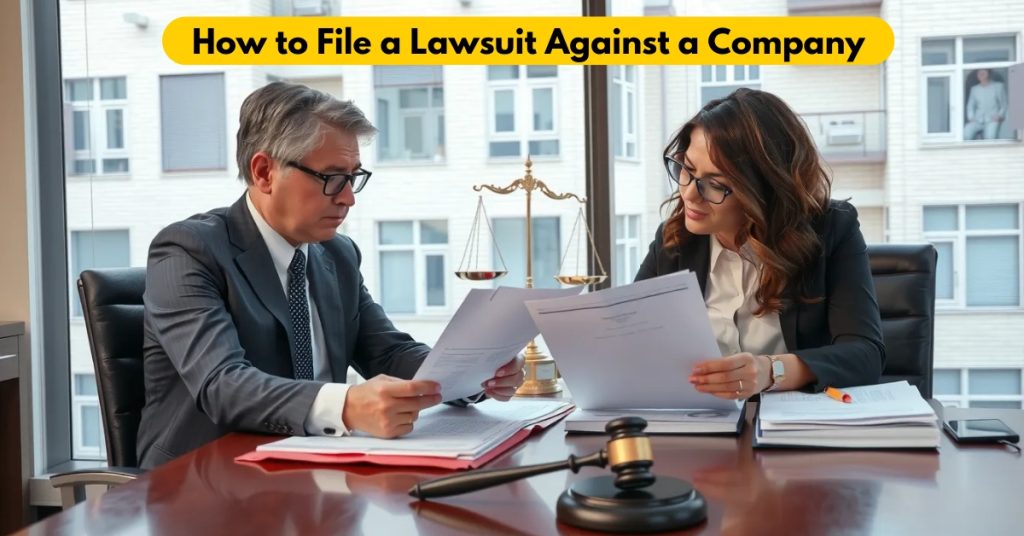
Going up against a big company in court can be tough. It takes smart planning and a lot of prep work to sue a company. You have to know how to move through the legal system and follow all the rules.
This guide will help you understand how to deal with corporate lawsuits. If you’re facing issues like broken contracts, rights being ignored, or unfair treatment at work, knowing what to do can help a lot.
Starting a lawsuit against a company involves many important steps. You need to gather all the right evidence and choose the right court. Each step is key to building a strong case.

Key Takeaways
- Understand your legal rights before initiating a lawsuit
- Collect comprehensive documentation and evidence
- Determine the appropriate court jurisdiction
- Consider potential legal costs and damages
- Explore alternative dispute resolution options
- Seek professional legal counsel when necessary
Understanding Your Legal Rights Before Filing a Corporate Lawsuit
Going up against a business in court can feel overwhelming. It’s key to know your legal rights before starting a lawsuit. Understanding the types of claims and their needs can guide your decision to sue.

Thinking about suing a company? You’ll find many reasons to do so. Knowing these claims is vital for a solid legal plan.
Types of Legal Claims Against Companies
- Breach of Contract: Violations of written or verbal agreements
- Consumer Protection Claims: Fraudulent practices or deceptive business conduct
- Employment Disputes: Discrimination, wrongful termination, or wage violations
- Product Liability: Injuries caused by defective products
- Intellectual Property Infringement: Unauthorized use of patents, trademarks, or copyrights
Statute of Limitations for Different Claims
Each claim has a time limit to file a lawsuit. The time frame changes based on the claim and where you are.
| Claim Type | Typical Statute of Limitations |
|---|---|
| Breach of Contract | 3-6 years |
| Personal Injury | 2-3 years |
| Employment Discrimination | 180-300 days |
| Product Liability | 2-4 years |
Determining If You Have a Valid Case
To check if your case is strong, look at these points:
- Gather all the needed documents
- Think about the cost of the lawsuit
- Get advice from a corporate litigation expert
- Make sure your claim is within the time limit
“Knowledge is power in legal proceedings. Understanding your rights is the first step toward effective legal action.” – Legal Expert
Suing a business needs careful planning and smart thinking. Every case is different. Getting help from a legal expert can make a big difference.
Gathering Essential Evidence and Documentation

Building a strong legal case needs careful evidence collection. When you’re dealing with a breach of contract or consumer rights issue, documents are key. The quality and detail of your evidence can greatly affect your lawsuit’s outcome.
Begin by gathering important documents that back up your claim. These usually include:
- Original contracts and agreements
- Email correspondence
- Financial transaction records
- Receipts and proof of payment
- Communication logs
Electronic evidence is very important today. Save all digital messages, screenshots, and records. Make a digital copy of these and keep them in order by date. Digital forensics can verify electronic evidence, making it stronger in court.
Witness statements can really help your consumer rights case. Look for witnesses who can support your story. This could be:
- Colleagues who saw what happened
- Experts who can confirm your claims
- Other customers with similar stories
It’s vital to keep your documents in order. Keep the originals safe and make certified copies. Also, document when and how you got each piece of evidence. This helps avoid questions about its authenticity in court.
Remember: Good and organized evidence can be the difference between winning and losing your case.
How to File a Lawsuit Against a Company
Starting a lawsuit against a company can seem daunting. But knowing the steps can make you feel more confident. The legal system has clear paths for those seeking justice against corporations.
Before starting, it’s important to know the main steps in a corporate lawsuit. Getting ready and gathering documents is key for success.
Preparing the Legal Complaint
Writing a strong legal complaint needs focus. Your complaint should:
- Clearly state the legal reasons for your lawsuit
- Describe the harm or damages you’ve faced
- Specify what you want in terms of relief or compensation
- Include important dates and evidence
Filing Court Documents
To start legal action against a company, follow these steps:
- Write the initial complaint document
- Pay the court filing fees
- Submit your documents to the right court
- Get a court case number
Serving Notice to the Defendant Company
Serving legal notice is a key step. It makes sure the company knows about the lawsuit. Professional process servers or certified mail are often used for this.
Each area has its own rules for serving documents. Talking to a local lawyer can help you follow these rules correctly.
Calculating Potential Damages and Legal Costs
Understanding the financial side of a civil lawsuit is key. Damages can change a lot based on your case’s details. Knowing what you might get back helps decide if going to court is right for you.
There are several main types of damages:
- Compensatory Damages: These are direct money losses from the incident.
- Punitive Damages: These are money penalties to punish bad behavior.
- Statutory Damages: These are fixed amounts set by laws.
Legal costs are also important to think about. You might have to pay for:
- Court filing fees
- Lawyer fees and hourly rates
- Costs for expert witnesses
- Expenses for documents and research
Before starting a lawsuit, talk to a good lawyer. They can give you a clear idea of what damages and legal costs might be. This advice will help you decide if suing is the best choice for you.
Choosing the Right Court Jurisdiction
Picking the right court for your lawsuit is key. It’s important to know the differences in court systems. The right place can greatly affect your case’s success and what you might win.
When you’re in legal trouble, you must think about several things. These will help you choose the best court for your case.
Small Claims vs. Civil Court Differences
Deciding between small claims and civil court depends on a few things:
- Total monetary damages sought
- Complexity of your legal case
- Amount of evidence available
- Potential legal representation costs
State vs. Federal Court Considerations
It’s important to know the difference between state and federal courts. Here’s a quick comparison:
| State Court | Federal Court |
|---|---|
| Handles local disputes | Addresses interstate or constitutional issues |
| Lower filing costs | More complex filing process |
| Faster resolution typically | Longer legal proceedings |
Venue Selection Strategy
When picking your legal venue, consider these points:
- Geographic proximity to incident location
- Jurisdictional laws favoring your case
- Potential jury demographics
- Historical case precedents in that court
Pro tip: Talk to a lawyer to find the best jurisdiction for your case.
Working with Legal Representatives
Going up against a company in court needs smart lawyer help. The right lawyer can change how you handle disputes. They bring skills that boost your winning chances.
When picking a lawyer for corporate lawsuits, look at these key points:
- Specialized experience in corporate lawsuits
- Track record of successful dispute resolution
- Understanding of your specific legal challenge
- Clear communication skills
Lawyers charge in different ways. They usually offer three main payment plans:
- Hourly rates
- Contingency fees
- Flat fee agreements
At first meetings, make a list of important questions. Ask about their corporate lawsuit history, case strategies, and time estimates. A good lawyer gives you key insights into legal battles.
Effective legal representation transforms challenging corporate disputes into manageable legal processes.
Your lawyer is your main defender in disputes. They help you understand complex laws, make strong arguments, and navigate legal challenges.
Navigating the Discovery Process and Legal Proceedings
After filing a lawsuit, plaintiffs enter a critical phase. This phase can greatly affect the case’s outcome. The discovery process is key, where both sides share important information and plan their strategies.
Knowing courtroom procedures makes clients feel more confident and ready for litigation. The discovery phase includes several important steps. These steps help both sides gather vital evidence and information.
Document Requests and Depositions
During legal proceedings, parties can ask for various documents to support their case. These requests often include:
- Financial records
- Internal communications
- Email correspondence
- Contracts and agreements
Depositions are another crucial part of discovery. These sworn testimonies let attorneys ask witnesses questions under oath. They create a detailed record for future court appearances.
Court Appearances and Procedures
Courtroom procedures can be complex and scary. Clients should prepare by:
- Dressing professionally
- Arriving early
- Bringing necessary documentation
- Following courtroom etiquette
Settlement Negotiations
Settlement negotiations are a key part of legal proceedings. Experienced attorneys help clients weigh settlement offers. They consider risks, costs, and potential trial outcomes.
Successful negotiation requires analyzing the case’s strengths, potential damages, and the long-term effects of accepting or rejecting a settlement.
Alternative Dispute Resolution Options
When dealing with corporate litigation, businesses and individuals look for ways other than court. Alternative dispute resolution (ADR) offers flexible and cost-effective ways to solve conflicts outside court.
Mediation and arbitration are two main strategies. Each has its own benefits for handling complex legal issues.
- Mediation: A collaborative process where a neutral third party helps conflicting parties negotiate a mutually acceptable solution
- Arbitration: A more formal procedure where an arbitrator makes a binding decision after hearing both sides
The advantages of ADR include:
- Lower legal costs
- Quicker resolution times
- More privacy than public court cases
- More flexible negotiation chances
Using ADR methods can be a smart first step in corporate litigation. It can save a lot of time and money by avoiding long court battles.
The right dispute resolution method can transform a potential lengthy court battle into a constructive dialogue.
Choosing the right ADR method depends on your legal situation, contract needs, and goals. Getting advice from a legal expert can help find the best strategy for your case.
Conclusion
To sue a business, you need a solid plan and careful prep. Knowing the legal rules is key. Every step, from gathering evidence to picking a lawyer, requires focus.
Starting a lawsuit against a company can feel overwhelming. But, with the right knowledge, you can build a strong case. Whether you want money or to stop bad business practices, a clear plan helps. Getting help from a lawyer can greatly improve your chances of winning.
But, suing isn’t the only way to solve problems. Methods like mediation can be quicker and cheaper. Your main goal is to fix the issue and protect your rights. Stay informed, patient, and strategic to move through the legal process confidently.
Every legal fight is a chance to fight for justice and hold companies responsible. With good prep, realistic hopes, and expert help, you can tackle your lawsuit. You’ll work towards a fair outcome that meets your goals.
FAQ
How much does it cost to file a lawsuit against a company?
The cost depends on the lawsuit type and court. Small claims court fees are $50 to $500. Civil court fees are $300 to $1,000. Lawyer fees can be hourly (200 to 500 dollars) or a percentage of the settlement (30-40%).
How long does a lawsuit against a company usually take?
Lawsuit time varies from months to years. Small claims might take 3-6 months. Complex cases can take 2-5 years, based on case complexity and court schedules.
Do I need a lawyer to file a lawsuit against a company?
You don’t have to hire a lawyer, but it’s recommended for complex cases. For claims under $5,000, you can represent yourself. But for big cases, a lawyer can greatly increase your chances of winning.
What types of evidence do I need to support my lawsuit?
You’ll need strong evidence like contracts, emails, financial records, and receipts. Also, photographs, witness statements, and proof of financial losses are important.
Can I sue a company in a different state?
Yes, you can sue in another state. But, you must consider jurisdiction and venue. The court location depends on where the company operates and where the incident happened.
What is the typical statute of limitations for filing a lawsuit?
Statute of limitations varies by state and claim type. Breach of contract claims are 3-6 years. Personal injury claims are 2-3 years. Consumer protection violations have different limits, so check your state’s laws quickly.
What alternatives do I have to filing a lawsuit?
You can try mediation or arbitration. Mediation is a negotiation process. Arbitration is a formal decision-making process. Both are faster and less expensive than lawsuits.
How much money can I potentially recover in a lawsuit?
You can get compensatory damages (actual losses), punitive damages (punishment), and sometimes legal fees. The amount depends on your case specifics. It can be a few thousand dollars or millions, based on damages and company actions.
also read:-
Seaworld Legal Battles: how many lawsuits against seaworld ?
Is Medical Malpractice a Personal Injury Lawsuit? A Comprehensive Guide